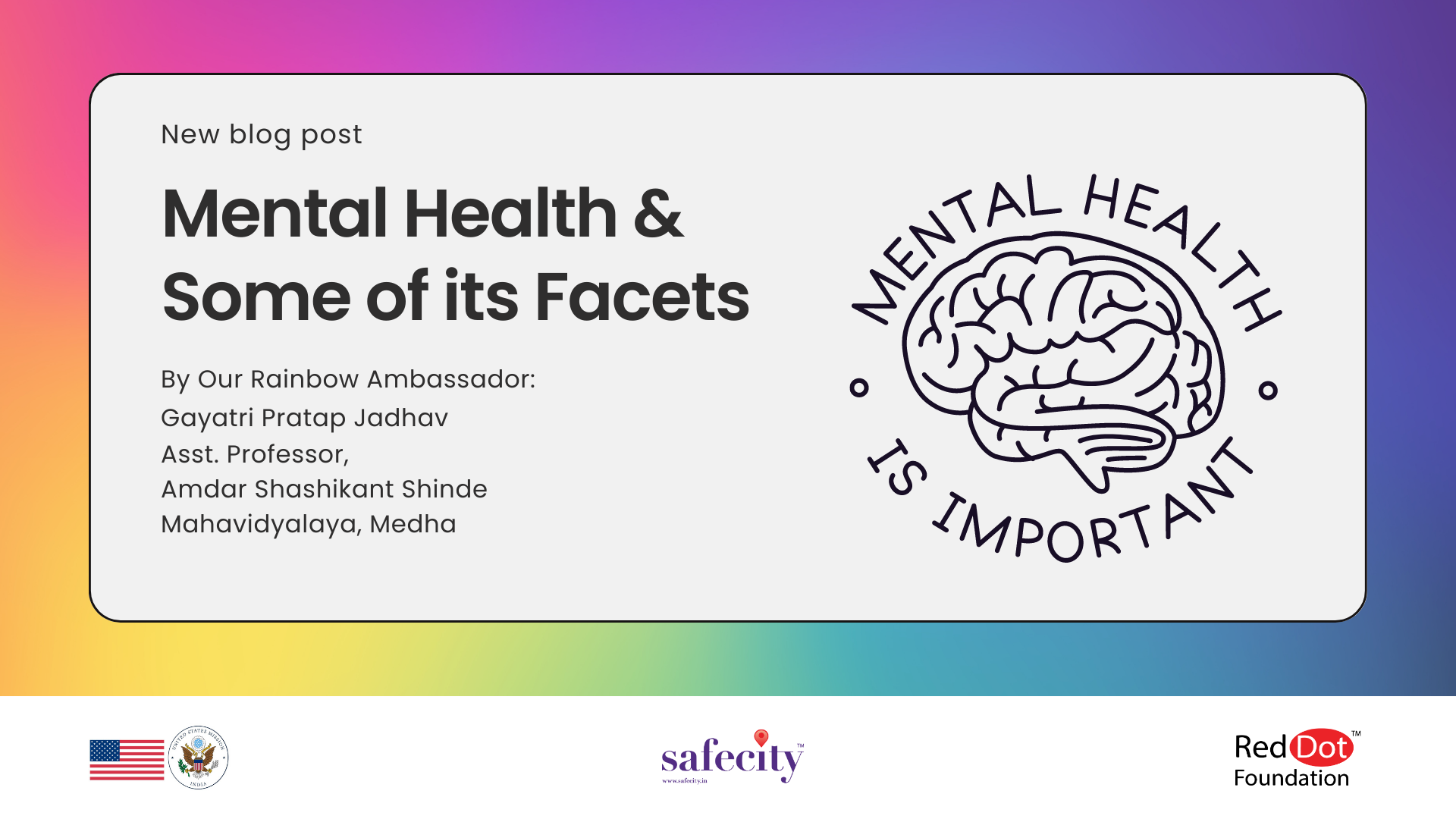Mental Health & Some of its Facets

By Gayatri Pratap Jadhav
Mental health is the overall wellness of how you think, regulate your feelings and behave. Mental health includes our emotional, psychological, and social well-being. It affects how we think, feel, and act, and helps determine how we handle stress, relate to others, and make choices. Mental health is important at every stage of life, from childhood and adolescence through adulthood and ageing. Mental health is a state of mental well-being that enables people to cope with the stresses of life, realize their abilities, learn well and work well, and contribute to their community.
Mental illnesses are disorders, ranging from mild to severe, that affect a person’s thinking, mood, and/or behavior. According to the National Institute of Mental Health, nearly one-in-five adults live with a mental illness.
Many factors contribute to mental health conditions, including:
- Biological factors, such as genes or brain chemistry
- Life experiences, such as trauma or abuse
- Family history of mental health problems
Some mental health topics include:
- Antisocial personality disorder
- Anxiety disorders (including generalized anxiety, panic disorders, obsessive-compulsive disorder (OCD), phobias, and social anxiety)
- Attention-deficit hyperactivity disorder (ADHD)
- Bipolar disorder
- Borderline Personality Disorder (BPD)
- Depression
- Eating disorders (including Anorexia Nervosa, binge eating Disorder, and Bulimia Nervosa)
- Post-traumatic Stress Disorder (PTSD)
- Schizophrenia
- Seasonal affective disorder (SAD)
- Self-harm
- Suicide and suicidal behavior
Early Warning Signs & Symptoms
- Marked changes in personality
- Eating or sleeping too much or too little
- Feeling of disconnection from people
- withdrawal from normal activities
- Having low or no energy
- Feeling numb or like nothing matters
- Having unexplained aches and pains
- Feeling helpless or hopeless
- Smoking, drinking, or using drugs more than usual
- Feeling unusually confused, forgetful, on edge, angry, upset, worried, or scared
- Yelling or fighting with family and friends
- Experiencing severe mood swings that cause problems in relationships • Having persistent thoughts and memories you can’t get out of your head • Hearing voices or believing things that are not true
- Thinking of harming yourself or others
- Inability to perform daily tasks like taking care of your kids or getting to work or school
- An inability to cope with problems or daily activities
- Unusual or “magical” thinking
- Excessive anxiety
- Prolonged sadness, depression or apathy
- Thoughts or statements about suicide or harming others
- Substance misuse
- Extreme mood swings
- Excessive anger, hostility or violent behavior
Many people who have mental health disorders consider their signs and symptoms a normal part of life or avoid treatment out of shame or fear. With appropriate support, you can identify mental health conditions and receive appropriate treatment, such as medications or counseling.
Care and treatment
Having a mental health condition can make it a struggle to work, keep up with school, stick to a regular schedule, have healthy relationships, socialize, maintain hygiene, and more.
However, with early and consistent treatment—often a combination of medication and psychotherapy—it is possible to manage these conditions, overcome challenges, and lead a meaningful, productive life.
- Treat yourself with kindness and respect, and avoid self-criticism.
- Make time for your hobbies and favorite projects.
- Do a daily crossword puzzle, plant a garden,
- take dance lessons,
- learn to play an instrument or
- Become fluent in another language.
- Eat nutritious meals
- Avoid smoking
- Stay away from alcohol
- Drink plenty of water
- Exercise, which helps decrease depression and anxiety and improve moods • Get enough sleep.
- Make plans with supportive family members and friends, or
- Seek out activities where you can meet new people, such as a club, class or support group.
- Help someone
- Practice good coping skills
- Try One-Minute Stress Strategies,
- Do Yoga, Tai Chi, exercise,
- Take a nature walk,
- Play with your pet or
- Try journal writing as a stress reducer. Also,
- Remember to smile and see the humor in life.
- Try meditating,
- Do prayer.
- Decide what you want to achieve academically, professionally and personally
- Write down the steps you need to realize your goals.
- Aim high, but be realistic and don’t over-schedule.
- Plan a road trip,
- Take a walk in a different park,
- Hang some new pictures or
- Try a new restaurant
- Keep alcohol use to a minimum and
- Avoid other drugs.
